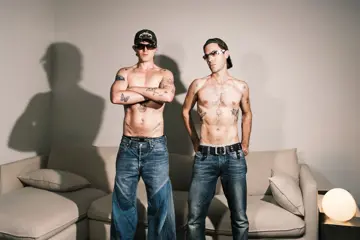Karin and Olof are brother and sister. Sometimes, when they are not performing independently as Fever Ray and Oni Ayhun respectively, they're The Knife: a glacial, Swedish media-phobic electronic duo infamous for juxtaposing garish synthesizers over manic social commentary, and basically, never ever speaking to journalists. Karin and Olof did not perform live concerts until 2006. They are almost completely anonymous to the public; most of the duo's promo pics feature the siblings wearing masks with birds' beaks, similar to the traditional Venetian plague doctor masks worn during Carnivale.
With the privacy-cracking culmination of basically every single technological development of the last decade, the duo's media-phobia is a feat in its own right, and three albums deep after their eponymous 2001 debut The Knife, their motives remain as opaque as the silvered side of a one-way mirror. In The Knife's third album Silent Shout's One Hit, Olof announced “Bend back, give head/It's not pornography/If you do it with lights/then it's art you see/if you do it with a twist”.
At the time, this seemed a rib-poke at masturbatory art-school posturing, but now, it's been resurrected as an ironic riddle – the elusive Swedes' debut track from fourth album Shaking the Habitual was Full Of Fire, a nine-minute techno-revivalist piece with a video directed by queer porn director Marit Ostburg. Ostburg's most notable previous work, Authority, featured a female police officer who chases a female vandal into an empty building, before the two engage in spitting, slapping and anal sex. But perhaps this is getting lost in semiotics; in a role-play by two notoriously illusive and contradictory artists. Case in point: the video for Full Of Fire apparently visualizes a policy that offers tax deductions for wealthy Swedes who employ women as maids for little pay. In the Full Of Fire video, Karin and Olof play a Swedish couple who are milking this tax break.
“You can look at how you organize yourself, how you work within the feminist and intersectional ideas that you have. For us, we have been really looking into who we work with, for example” Karin clarifies. “I think we have been really bad at that in the past, working with mostly male video directors and male music technicians and so on. I think this time we really wanted to work with female technicians, for example mastering engineers and all the technical crew that we will bring on tour. I think that is what you can do as an artist to look after how you work yourself within your field within your area.”
Don't miss a beat with our FREE daily newsletter
In sophomore record Deep Cut's afterglow, The Knife were awarded the Grammy for Pop Group of the Year in 2003, but they boycotted the ceremony by sending two representatives of the Guerrilla Girls (a feminist group dedicated to increasing female representation in the arts) as a protest against male dominance in the music industry. A decade later, and The Knife are apparently still dead serious about their gender theory and imposing a kind-of broad gender-based realignment across the entire music industry: prior to receiving approval for the interview, I was required to submit a portfolio of my written work to Karin and Olof. Although no official reason was give, it was strongly suggested this portfolio demonstrate some “feminist credentials”, to paraphrase an unfortunate publicist intermediary. My subsequent discussion with The Knife clarified: according to The Knife gender theory 101, this segregation extends to journalists too.
“For example, a music journalist, the norm of a music journalist is a man - for example now, we've done about twenty interviews so far, and uh… I think if we've done twenty, about two of the interviewers have been female,” Karin says. “I think it makes it much harder to become a music journalist if the norm is being a man. Well, what do you think about music journalism, for example? You must see mostly who gets to write about music?” she asks, kind-of inverting the whole interviewer/interviewee dynamic back on to of me for the second time in forty-eight hours (my having to provide a portfolio of writing for The Knife to review being her first). Karin's claim is unfair in the circumstances – Drum's writing team has about a 40/60 female/male split, but otherwise, there is certainly a distortion that favors men within music journalism as an industry.
“We have a patriarchal system in our society, and that is shown in all sides of society; it of course occurs in the music industry as well, a few of the structures…” explains Olof. “I think there's a huge amount of projections and things going that... one would be that in certain situations… I don't know where to start, there are so many things, in our society I believe that men are taught to that it's more ok to be a nerd and to put things into certain orders and um, kind-of give get the first tools you need to become a music journalist… I think that it is one factor and then another… men take more space by themselves, and just promote themselves better, I don't know if it's a good thing, men can only do promo, or like… ('marketing' Karin interjects) yes, men are so good at marketing themselves” says Olof.
Shaking The Habital, The Knife's soon-to-be-released record, is apparently about realizing the duo's rhetoric. The album has at least two tracks inspired by Margaret Atwood's Oryx and Crake, a post-apocalyptic novel that splices genetic engineering and androgyny into a morbid future. Habitual's second single, An Eye for An Eye invokes the faux-tribal high-tech low-life sound the act developed almost a decade ago in Deep Cuts' Pass This On. Karin and Olof are apparently intent on overturning the habitual; on usurping comfortable injustices. “I think within all male-dominated fields, it makes it harder for people who are not men who come into that profession… it should be open and free for everybody to be like a music technician, it has not anything to do with what gender you have or what sexuality or what class you have,” Karin asserts. “I think it's just a matter of showing an alternative and showing the possibility of… I know there is so many female musicians and technicians who have a hard time with the industry, it's so male-dominated, and I think we've got the chance to make a change about that, and this [the album] is one way of doing it.”
It all sounds quite intense, relentless, and iconoclastic – unusually heavy lifting for two artists who, prima facie, make gaudy electronic music. But The Knife's Soundcloud provides perhaps the most appropriate epithet for the duo - “This is the world of The Knife: precise, particular, dark, occult, funny-peculiar, funny-ha-ha.”















